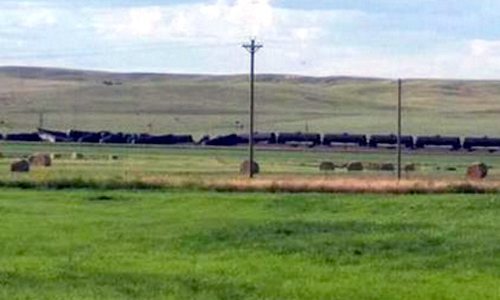

Three tank cars continued to leak crude oil on Friday in rural, northeastern Montana in the wake of a 21-car derailment that downed a power line, closed a major highway and forced the evacuation of a town. Emergency workers responding to the Thursday evening derailment said cleanup of the leaking crude could not begin until the arrival of a Texas-based Burlington Northern Santa Fe hazardous materials team. The wreck is the latest in a string of derailments this year exposing the still-unchecked dangers that crude-oil trains pose to people and the environment, and how unprepared communities are to deal with the threat.
A train carrying oil derailed in northeast Montana Thursday. http://t.co/CpsIhqvox9 pic.twitter.com/wtRm9rA7AV
— The Bismarck Tribune (@bistrib) July 17, 2015
“This derailment is only the latest reminder that the dangers of transporting crude by rail are magnified by the lack of equipment and training available to local emergency workers,” said Jared Margolis, an attorney at the Center for Biological Diversity who focuses on the impacts of energy development on endangered species. “Communities should not be forced to wait for industry hazmat teams to travel across the country while leaking oil contaminates our water and soil.”
The accident involving the 106-car train came just hours after another derailment had shut down rail traffic through the area. The accident comes on the heels of six other major oil train derailments just this year, including several explosive spills.
The accidents have exposed the ineffectiveness of new federal regulations for oil trains that will allow dangerous, puncture-prone tank cars to remain in service for up to 10 years. The new regulations allow oil trains to move at speeds well in excess of the puncture resistance of even the newer tank cars, and fail to limit the weight and length of oil trains to prevent derailments.
“A moratorium on oil trains is needed to prevent these disasters and ensure that emergency responders can be trained and equipped to take appropriate action after derailments,” Margolis said. “It’s irresponsible to continue to allow these dangerous trains to roll through our communities and across some our most pristine landscapes.”
YOU MIGHT ALSO LIKE
Exxon Exposed for Spending Millions on Climate Change Denial

 233k
233k  41k
41k  Subscribe
Subscribe 